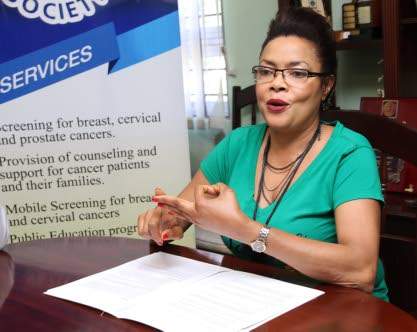ORE people are dying from colorectal cancer (CRC) in Jamaica.
In fact, the country is also seeing an increase in the number of colorectal cancer diagnoses.
The disclosure was made by Professor Joseph Plummer, who heads the Department of Surgery, Radiology, Anaesthesia and Intensive Care at The University of the West Indies in Kingston, in e-mailed responses to questions from the Observer.
“Based on data from the Jamaica Cancer Registry, there is an increase in the number of colorectal cancers being diagnosed locally, especially in men. Additionally, over the past decade, there is a gradual increase in the number of deaths attributable to colorectal cancers based of data from the Registrar General’s Department (RGD),” Professor Plummer said.
Yulit Gordon, executive director of the Jamaica Cancer Society, said at a media briefing earlier this month that cancer of the colon is the third leading cause of cancer-related deaths in the Jamaican population — behind prostate and lung cancer in males, and behind breast and cancer of the cervix in females.
She went on to cite 2018 statistics for Jamaica from the Global Cancer Observatory.
“The Global Cancer Observatory statistics for Jamaica for 2018 revealed that there were 642 new cases of colon cancer, which represented 9.44 per cent of all cancers in Jamaica. It further revealed that 373 persons died from colon cancer,” said Gordon, who also outlined the society’s activities for Colorectal Cancer Awareness Month, which is observed in March each year.
According to data prepared by the RGD and shared with the Observer, a “summary of malignant neoplasm of colon, rectum and anus by parish of residence of deceased for 2004-2017” showed that there were 220 deaths in 2008 compared to 380 deaths in 2017.
The same summary showed that there were 329 deaths in 2016. The Ministry of Health told the Observer that of that number, 184 were males and 145 were females.
Colorectal cancer, which is sometimes called colon cancer, is defined by the Centers for Disease Control and Prevention (CDC) as a form of cancer that occurs in the colon or rectum. According to the CDC, abnormal growths, called polyps, sometimes form in the colon — also called the large intestine or large bowel — or the rectum, which connects the colon to the anus.
Professor Plummer said that globally, Jamaica’s colorectal cancer rate is in the middle range.
“Still, Jamaica’s CRC rate is in the intermediate rate compared to high-incidence countries such as Canada and Australia, or low-incidence countries that are largely China or in Africa.
“Importantly, in the United States, the high incidence is on the decrease because of the removal of polyps at screening [with] colonoscopy, therefore the polyps do not get a chance to progress into cancers,” Professor Plummer said.
He explained, too, that, generally, males and females are equally at risk for colorectal cancer, even though locally, males seem to be slightly more affected.
Painting a picture of the local colorectal cancer situation, Professor Plummer said the majority of patients are diagnosed at an advanced stage and oftentimes need “multimodal therapy”, and with less chance of a cure.
“This is because few members of the population get screening and because of the great adaptive capacity of the bowels, tumours can get quite large before they cause significant symptoms.
“A lot of people do not realise that cancers are usually painless until they become advanced. The population should not ignore ‘red flag’ symptoms, such as bleeding, anaemia, change in bowel habits, or abdominal pain. Better yet, screening — starting at age 50 even though they are well — is advocated,” he said.
The UHWI department head went on to explain that the majority of cases are in people over age 50, with the mean age of diagnosis in the Jamaican population being 62 years.
“However, about 15 to 20 per cent of cases are under age 50, therefore someone at this age or younger who notices bleeding from the rectum should never be diagnosed only with haemorrhoids as the cause of the bleeding until a doctor looks in the rectum by flexible sigmoidoscopy or colonoscopy (if they are age 45 or older),” he said.
Professor Plummer admitted that no test is perfect, but said misdiagnosis is uncommon.
“A colonoscopy can miss two to three per cent of cancers, but in the setting of a symptomatic patient, the managing doctor should move on to doing additional investigations such as a CT (computed tomography) scan or barium enema, and the addition of these options are often good enough to establish the diagnosis,” he told the Observer.
In the meantime, as part of Colorectal Cancer Awareness Month, Gordon said the Jamaica Cancer Society, in partnership with Bio-Medical Laboratory, has been targeting 250 individuals between the ages of 45 and 65 years to do the fecal occult blood test — one of the screening tools for early signs of colon cancer.
“The fecal occult blood test is widely accessible and has proven effective in identifying blood in the stool which cannot be seen with the naked eye. This raises a red flag for the need for further investigation to confirm the presence of polyps or cancer in the colon,” Gordon said.
The partnership is expected to last through to June and the data gathered from this pilot project will be used as part of a wider research initiative on colon cancer in Jamaica.










